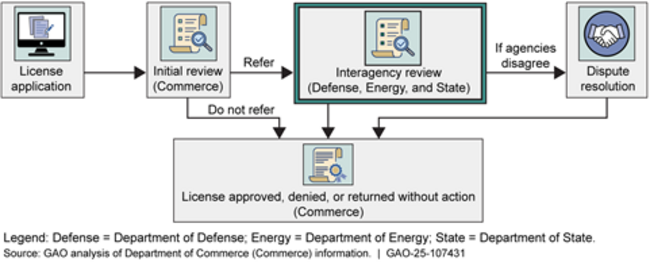Export Controls: Commerce Should Improve Workforce Planning and Information Sharing
Fast Facts
The Bureau of Industry and Security oversees export of "dual-use" items—including computer chips—that can have both civilian and military uses. To protect U.S. national security while still facilitating trade, the bureau issues export licenses which are reviewed by the Departments of Defense, Energy, and State.
The bureau:
Hasn't assessed its long-term workforce needs, including size and composition—in light of its growing workload
Could better communicate with other agencies, such as by allowing ready access to all relevant information and consulting with them over license changes
Our recommendations address these issues.

Highlights
What GAO Found
Funding for Commerce’s Bureau of Industry and Security (BIS) grew by $97 million and roughly doubled from fiscal years 2013 through 2024. During this timeframe, the number of funded positions in BIS went from 403 to 585—an overall increase of 182 positions. About $58 million (60 percent) of BIS’s 12-year funding increase was appropriated in fiscal years 2022 and 2023. BIS primarily used these recent increases in two areas. First, to bolster implementation and enforcement of export controls in response to Russia’s 2022 invasion of Ukraine. Second, to create a new office focused on securing the U.S. information and communications technology and services supply chain.
However, BIS does not have a long-term workforce plan to determine its resource needs. Instead, BIS assesses its staffing needs on an annual basis as part of the budget request process. BIS last conducted a bureau-wide workforce planning effort in 2016. Comprehensive, long-term workforce planning would help BIS leadership determine the size and composition of its workforce needed to meet its expanding workload and better position it to reduce the risk of exporting sensitive, dual-use items to an adversary.
BIS oversees an interagency export license review process which includes reviews by the Departments of Defense (DOD), Energy (DOE), and State. However, challenges to information-sharing and limited consultation compromise the integrity of these reviews. For example, BIS does not provide the agencies ready access to all relevant information about export license applications, which is housed in multiple classified and unclassified systems. Providing reviewing agencies with easy access to all information relevant to license applications would help ensure reviews are well informed. In addition, officials from reviewing agencies told us that BIS has sometimes removed agreed upon license conditions without consultation. According to BIS, it removed conditions that were redundant or inconsistent with standard licensing provisions. Consulting with reviewing agencies prior to changing or removing conditions would help ensure that licensing decisions fully reflect national security risks and other concerns.
Key Steps in Interagency Review Process for Commerce’s Bureau of Industry and Security Export License Applications, as of April 2025

Why GAO Did This Study
To address varied foreign policy and national security concerns, the U.S. government has increasingly used export controls. For example, the U.S. has imposed export controls to restrict access to advanced semiconductors that could aid the People’s Republic of China in developing military systems powered by artificial intelligence.
BIS is primarily responsible for reviewing applications and issuing licenses to exporters of dual-use technologies that could be used for both civilian and military purposes. DOD, DOE, and State also play roles in reviewing export license applications.
GAO was asked to review BIS’s resources and processes for export licensing. This report examines (1) BIS's resources from fiscal years 2013 through 2024, (2) the extent to which BIS has conducted workforce planning, and (3) the extent to which BIS shares information and consults with reviewing agencies. GAO reviewed legislation and agency documents; interviewed Commerce, DOD, DOE, and State officials; and analyzed agency funding, staffing, and workload data.
Recommendations
GAO is making four recommendations, including that Commerce conduct long-term workforce planning, provide reviewing agencies access to all relevant information, and consult with reviewing agencies prior to changing license conditions. Commerce concurred with the recommendations.
Recommendations for Executive Action
| Agency Affected | Recommendation | Status |
|---|---|---|
| Department of Commerce | The Secretary of Commerce should ensure that the Under Secretary for Industry and Security develops a long-term workforce plan to determine the resources and personnel it needs to meet its growing workload. (Recommendation 1) |
When we confirm what actions the agency has taken in response to this recommendation, we will provide updated information.
|
| Department of Commerce | The Secretary of Commerce should ensure that the Under Secretary for Industry and Security works with DOD, DOE, and State to facilitate access to all relevant information on each export license application. (Recommendation 2) |
When we confirm what actions the agency has taken in response to this recommendation, we will provide updated information.
|
| Department of Commerce | The Secretary of Commerce should ensure that the Under Secretary of Industry and Security consults with reviewing agencies prior to changing export license application conditions recommended by one or more of those agencies. (Recommendation 3) |
When we confirm what actions the agency has taken in response to this recommendation, we will provide updated information.
|
| Department of Commerce | The Secretary of Commerce should ensure that the Under Secretary for Industry and Security clarifies and reaches agreement with State, DOD, and DOE on written guidance for the use of export license conditions. (Recommendation 4) |
When we confirm what actions the agency has taken in response to this recommendation, we will provide updated information.
|
